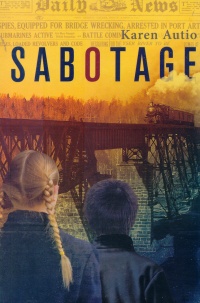| ________________
CM . . .
. Volume XX Number 24. . . .February 21, 2014
excerpt:
Following Second Watch and Saara’s Passage, Sabotage concludes a trilogy of historical fiction based on a family of Finnish immigrants living on the north shore of Lake Superior. This story is narrated alternately from the perspectives of Saara Mäki and her younger brother, Jussi (John). It begins as summer starts, 11 months after the outbreak of World War I. Thirteen-year-old Saara has returned to Port Arthur after months spent helping her sick aunt, and she is intent on making up the time missed at school so that she will be promoted to the next grade in the fall. If she fails, her dream of becoming a school teacher will be dashed; but, completing her special school assignments is hard since she’s expected to do so much work for her parents who, like many other new-immigrant families, are struggling to make ends meet. When Saara attempts to bolster the family’s income, and to support the war effort, she discovers first-hand the growing antipathy towards all new immigrants in Port Arthur. Nine-year-old John has a newspaper delivery route and hopes to become a news reporter when he grows up. He is observant, has a quick wit, and an unrelenting interest in WW I spies and “sabotagers” that might be lurking around Port Arthur. When he tries to convince Saara that there are saboteurs in Port Arthur, she’s skeptical, pointing out that news stories are often embellished and not to be believed. John sees the truth of her observation after he helps police find hidden sticks of dynamite without a fuse to ignite them, yet news-reporter Cam writes that the dynamite could have “exploded at any time.” Nevertheless, John saw the strange man who planted the dynamite, and many other strange things are going on in Port Arthur: John’s friend, Fred’s father is arrested, made a POW without any trial, and sent to an internment camp for an indefinite period of time apparently for the ‘crime’ of having immigrated from the Ukraine; pieces of clothing drying on clotheslines – like Mama’s dress – are occasionally disappearing; Saara’s best friend and an elderly neighbour are ignoring Saara since she has befriended Birgitta Schmidt; Papa, who works hard and whenever he can, is anonymously threatened with black-listing for his attempts to organize a union as well as associating with Birgitta’s father. The tension in Sabotage increases gradually and credibly, culminating in Saara and John’s attempt to exonerate their father who has been charged with a serious war crime and jailed. Throughout the story, the apprehension, politics, and consequences surrounding divisive personal and governmental decisions taken because of WW I are considered, as in the following conversation between John, Saara, and their father.
Autio seamlessly integrates historical detail into the various plot threads. For instance, Saara receives censored letters from Birgitta in an internment camp after her mother opts to accompany her father upon his arrest; after Fred’s mother decides they will not go into internment with her husband, both she and Fred are eventually arrested for stealing food to keep from starving; each chapter begins with a relevant quote from the Port Arthur newspaper that John delivers. At the beginning of Sabotage, siblings John and Saara notice changes in each other after their months-long separation. John, a prankster, observes that Saara seems older and more serious – “almost like Mama” – since her return. He wants to make her smile again. Saara is surprised by her brother’s desire and ability to undertake more responsible roles in the family; however, she mistakes the intent of John’s pranks, retaliates with her own, and they quickly fall back into their accustomed rivalry. While on the one hand, they are only 13 and nine years of age so this behaviour could be credible; on the other hand, they are both convincingly bright, driven, and relatively mature – therefore too old for such behaviour. (John’s limited vocabulary skills are also not entirely believable, given his apparent intellect.) By the end of the novel, Saara and Jussi are able to set aside their conflict and work together to save Papa and the family. Relevant historical photographs presented at the end of the novel will appeal to all readers. Also included are a glossary of Finnish words and pronunciations, as well as a brief list of books and on-line resources for readers interested in further research. Sabotage is a rich blend of compelling plot threads, fascinating historical detail, and concepts as relevant in today’s world as they were back in 1915. Highly Recommended. Karen Rankin is a Toronto teacher and writer of children’s stories.
To comment
on this title or this review, send mail to cm@umanitoba.ca.
Copyright © the Manitoba Library Association. Reproduction for personal
use is permitted only if this copyright notice is maintained. Any
other reproduction is prohibited without permission.
NEXT REVIEW |
TABLE OF CONTENTS FOR THIS ISSUE
- February 21, 2014.
AUTHORS |
TITLES |
MEDIA REVIEWS |
PROFILES |
BACK ISSUES |
SEARCH |
CMARCHIVE |
HOME |
